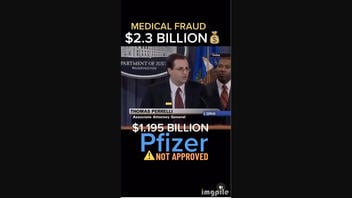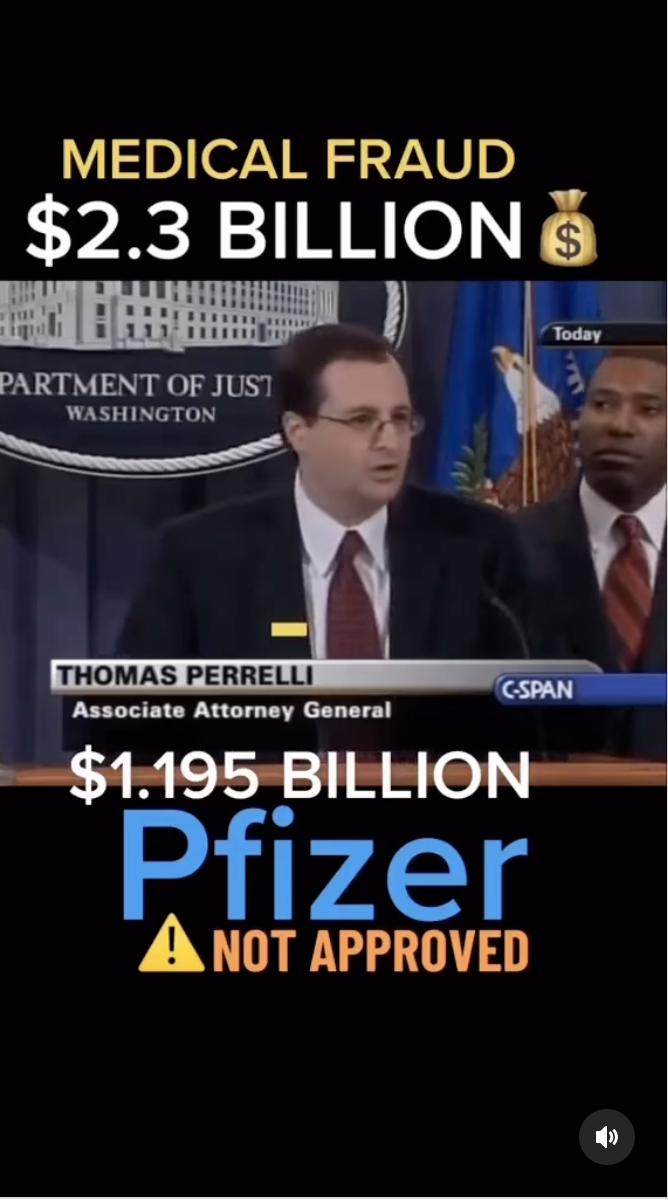Fact Check: Pfizer Did NOT Just Agree To Pay $2.3 Billion In Largest Health Care Fraud Settlement In DOJ History — Happened In 2009, Unrelated to C-19 Vaccine

Did Pfizer recently agree to pay $2.3 billion for medical fraud, the largest health care fraud settlement in the history of the U.S. Department of Justice and was this related to Covid-19 vaccination? No, that’s not true: Pfizer did agree to pay such a settlement in 2009, but not in 2023. The settlement was for the misbranding of the anti-inflammatory drug Bextra “with the intent to disfraud or mislead” and for the “illegal promotion” of Bextra and other drugs. Pfizer removed Bextra from the market in 2005, according to the Justice Department.
The claim about the settlement appeared in a video (archived here) on Instagram on September 18, 2023. The video was captioned:
MEDICAL FRAUD $2.3 BILLION💰
$1.195 BILLION Pfizer
⚠️NOT APPROVED
You think the hijack is paying out because they’re innocent❔
Stay tuned for the next episode.
This is how the post appeared on Instagram at the time of writing:
(Source: Instagram screenshot taken Fri Sept 22 18:34:12 UTC 2023)
While the post does not mention COVID-19 vaccines, by publishing the claim in 2023, it does imply that the Pfizer settlement could be related to the vaccines. Pfizer was one of the largest manufacturer of the shots.
The caption on the post, “Dear Pfizer… can your 💰 bring back lives❓….” could be interpreted as meaning that the money the company is paying will not bring back anyone who lost their lives from health complications caused by a COVID vaccine. However, the settlement was announced in 2009 and has nothing to do with COVID vaccines.
The post includes a video of former U.S. Associate Attorney General Thomas Perrelli standing at a podium in front of the Department of Justice (DOJ) seal and saying:
Pfizer has agreed to pay $2.3 billion, the largest health care fraud settlement in the history of the Department of Justice.
Within that $2.3 billion is a criminal fine of $1.195 billion, which makes it the largest criminal fine in history.
The settlement with Pfizer happened in 2009, according to a DOJ press release (archived here) titled, “Justice Department Announces Largest Health Care Fraud Settlement in Its History.” The release said the charges were for fraudulent marketing and that the $2.3 billion Pfizer Inc. and its subsidiary, Pharmacia & Upjohn Company Inc., agreed to pay was “the largest health care fraud settlement in the history of the Department of Justice, to resolve criminal and civil liability arising from the illegal promotion of certain pharmaceutical products.”
Pfizer pleaded guilty to a “felony violation of the Food, Drug and Cosmetic Act for misbranding Bextra with the intent to defraud or mislead. Bextra is an anti-inflammatory drug that Pfizer pulled from the market in 2005,” the release said.
Video from the September 2, 2009, press conference can be found on C-SPAN. At the 1:22 mark in the video, Perrelli’s comments match his words in the clip posted on Instagram. Perrelli stepped down as associate attorney general in 2012, as NPR reported at the time.
Details of the allegations against Pfizer were listed in the DOJ release:
Under the provisions of the Food, Drug and Cosmetic Act, a company must specify the intended uses of a product in its new drug application to FDA. Once approved, the drug may not be marketed or promoted for so-called ‘off-label’ uses – i.e., any use not specified in an application and approved by FDA. Pfizer promoted the sale of Bextra for several uses and dosages that the FDA specifically declined to approve due to safety concerns.
Other Lead Stories fact checks of claims about Pfizer can be found here and about the COVID-19 can be found here.
This article has been archived for your research. The original version from Lead Stories can be found here.


